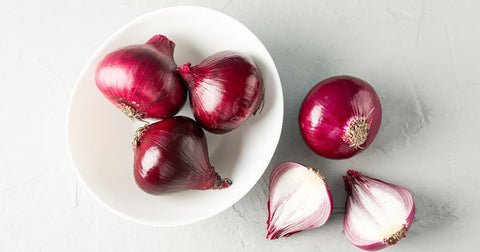Whether you’re slicing them into a salad or steeping them into tea, red onions are a colorful, flavorful staple in many kitchens. But if you’re wondering, are red onions good for you, the answer goes deeper than taste. These vibrant bulbs are packed with antioxidants, vitamins, and plant compounds that offer a range of health benefits.

In this article, we’ll explore the nutrition facts, health perks, and potential downsides of red onions including information on red onion calories, carbs in red onion, and the rising interest in red onion tea benefits. If you’ve experienced discomfort or digestive issues after eating onions, we’ll also cover how a food sensitivity test kit can help uncover possible food intolerance.
Are Red Onions Good for You?
Yes red onions are good for you in moderation. They’re rich in antioxidants, low in calories, and naturally anti-inflammatory. Unlike white or yellow onions, red onions contain higher levels of anthocyanins, the same heart-healthy pigments found in berries and red cabbage.
Key nutritional highlights:
-
Low in calories
-
High in vitamin C
-
Good source of quercetin (a powerful antioxidant)
-
Supportive of gut and heart health
If you're looking for simple, flavorful ways to improve your diet, red onions are a great place to start.
Red Onion Calories and Carb Count: Are They Diet Friendly?

If you're counting calories or managing your carbohydrate intake, you may be asking: how many calories in red onion? or what about carbs in red onion?
Per 100 grams (about half of a medium onion):
-
Calories: ~40–45
-
Carbohydrates: ~9–10g
-
Fiber: ~1.5g
-
Sugars: ~4.5g
-
Protein: ~1g
These numbers make red onions a low-calorie, low-fat food suitable for most eating plans including keto, paleo, Mediterranean, and plant-based diets as long as portions are controlled.
Health Benefits of Red Onions
So, what exactly makes red onions a health-promoting ingredient? Here’s a closer look at why red onions are good for you:

1. Antioxidant-Rich
Red onions are one of the top vegetable sources of quercetin, an antioxidant linked to reduced inflammation, improved immunity, and even cancer-fighting properties. Their vibrant color also comes from anthocyanins, which help fight oxidative stress and support heart health.
2. Supports Heart Health
Quercetin and sulfur compounds in onions have been shown to reduce blood pressure, prevent blood clots, and improve cholesterol levels.
3. Promotes Digestive Wellness
The fiber and prebiotics in red onions feed beneficial gut bacteria, making them a supportive food for digestion.
4. May Help Blood Sugar Regulation
Some compounds in onions may help regulate insulin and reduce blood sugar spikes, especially in people with insulin resistance or type 2 diabetes.
What Are Red Onion Tea Benefits?
A growing trend in natural health circles is red onion tea an herbal infusion made by simmering red onion slices in hot water. While more research is needed, advocates claim it may:
-
Ease congestion and sinus pressure
-
Support detoxification and liver function
-
Reduce inflammation
-
Help relieve sore throats
How to make red onion tea:
-
Slice half a red onion
-
Add to a small pot with 1.5 cups of water
-
Simmer for 10 minutes
-
Strain and drink while warm
For added flavor, many people add ginger, honey, or lemon. While not a cure-all, red onion tea may offer gentle wellness support during cold and allergy seasons.
Food Intolerance and Red Onions: When to Be Cautious

Despite the benefits, not everyone digests red onions easily. If you experience bloating, gas, fatigue, or skin issues after eating onions, you might have a food intolerance.
Common signs of onion intolerance:
-
Bloating or abdominal discomfort after meals
-
Brain fog or sluggishness
-
Headaches or skin flare-ups
-
Gas and irregular digestion
This is where a food sensitivity test kit can help. By identifying low-grade immune responses to foods like red onion, you can better tailor your diet to avoid inflammation and discomfort.
Final Verdict: Are Red Onions Good for You?

Red onions are good for you when included as part of a balanced diet. They offer antioxidant power, support heart health, promote digestion, and add flavor without excess calories. Whether raw in salads or brewed as a tea, they can be a nutrient-rich addition to your meals.
However, if you’ve noticed discomfort or unexplained symptoms after eating onions, don’t ignore it. A food sensitivity test kit can help you determine whether red onions or another common food may be the culprit.
Frequently Asked Questions (FAQs)
1. Are red onions healthier than white onions?
Yes, red onions contain more antioxidants, especially anthocyanins and quercetin, making them more nutritionally dense than white or yellow varieties.
2. How many calories in red onion?
About 40–45 calories per 100g (roughly half of a medium red onion).
3. What are the carbs in red onion?
One hundred grams of red onion contains about 9–10 grams of carbohydrates, including around 4.5 grams of natural sugars.
4. What are red onion tea benefits?
Potential benefits include reducing inflammation, supporting detoxification, and soothing respiratory symptoms.
5. Should I take a food sensitivity test kit if red onions bother me?
Yes. If you suspect a food intolerance, a test can help pinpoint if red onions are causing symptoms so you can adjust your diet accordingly.


.png?v=1737390083)
.png?v=1737187409)


